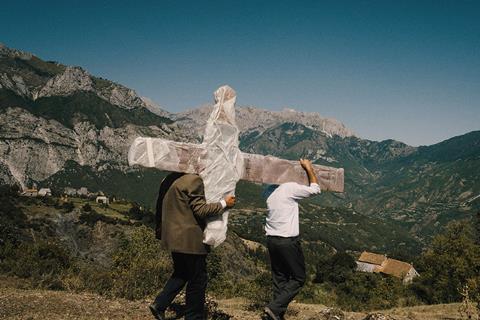In the mountains of Albania, a father seeks retribution for the murder of his daughter

Dir: Marija Zidar. Slovenia/Serbia/Montenegro/Kosovo. 2021. 82 mins.
Slovenian director Marija Zidar’s feature documentary debut feels particularly resonant in the wake of the George Floyd trial. While there may seem nothing in common between the streets of Minneapolis and the mountains of northern Albania, US civil rights and Balkan blood feuds, Zidar’s film illustrates a powerful connection: the extremely difficult, emotionally charged, sometimes political path to reconciliation.
The filmmakers’ approach is low-key but ever-present
Reconciliation was shot over a period of five years, as a father struggles to decide whether to seek revenge against the family that killed his 18-year-old daughter. The result is carefully observed, nuanced and – considering its title could include a question mark – gripping. These qualities, along with its universal theme, ought to garner further festival outings, especially where there is a focus on civil rights.
The murder at the heart of the film brings into sharp relief the tensions in Albania that developed after the fall of Communism in 1990, between a constitutional form of justice still finding its feet and the desire of people living in the Albanian highlands to fall back on ancient tribal law, the Kanun, to settle their differences.
The teenager Gjyste Paplekaj was shot dead in 2013, during a heated row between her father Gëzim and a neighbour and cousin, Fran, who claimed to have fired the shots in anger and hit the girl by accident. He received a 14-year jail sentence, which is barely considered as a factor in the subsequent deliberations. All that matters is how Gëzim himself will respond. Kanun allows for blood revenge, which in Fran’s absence would fall on his brother Pjetër, but it also has a blueprint for forgiveness and reconciliation. Which will Gëzim choose?
Zidar and her Kosovan-Albanian DoP Latif Hasolli started shooting a year after Gjyste’s death, which is when advocates for reconciliation can make their approach to the victim’s family – with men only allowed into the discussions. Gëzim is lobbied by two bodies, each wanting him to seek a peaceful course in their name: the church, in the form of a rather kindly and soft-sell monsignor, and the Nationwide Reconciliation Committee, a civil society led by the more aggressive, wheeler-dealing chairman Gjin Marku, who is seeking to promote the old traditions and become a player in the country’s justice system.
The filmmakers’ approach is low-key but ever-present (they shot 250 hours of material), winning the trust that allows them to capture everything from solitary, tearful moments of contemplation to fiercely angry debate, from touching family time to Marku’s tenacious attempts to turn the dead girl into a symbol for his cause. Particular attention is paid to the outrageous, patriarchal marginalisation of the one person who ought to be involved in this appalling process with Gëzim, namely his wife Vera. In fact, the camera’s best moments are focused on her brooding face, lips trembling, a volcano waiting to erupt in the corner of the room.
Zidar and her editor Uroš Maksimović also manage to deliver the complexities of the years-long family feud that led to the murder, and the conflict in Gëzim between his Christian beliefs and the Kanun codes. All that’s missing is an adequate reflection of the passing of time (it’s a shock when the monsignor suddenly dies) and a fitting acknowledgement of the elephant in the room – the possibility of more violence.
Production company: Vertigo Ljubljana: info@vertigo.si
Producer: Danijel Hočevar
Editing: Uroš Maksimović
Cinematography: Latif Hasolli
Music: Dimitrije Vasiljević






![The Brightest SunScreen[Courtesy HKIFF]](https://d1nslcd7m2225b.cloudfront.net/Pictures/274x183/3/5/0/1448350_thebrightestsunscreencourtesyhkiff_312678.jpg)















![The Brightest SunScreen[Courtesy HKIFF]](https://d1nslcd7m2225b.cloudfront.net/Pictures/100x67/3/5/0/1448350_thebrightestsunscreencourtesyhkiff_312678.jpg)

